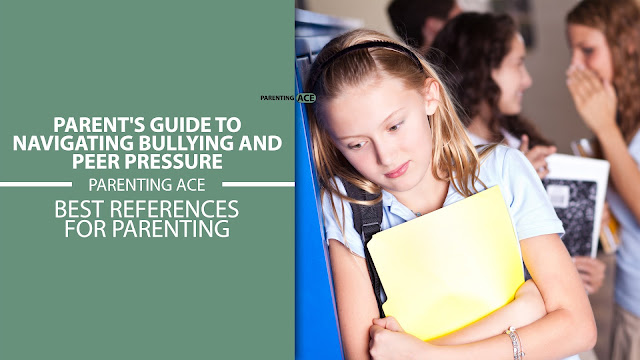Navigating Bullying and Peer Pressure: A Guide for Parents
In today's dynamic social landscape, navigating the complexities of childhood and adolescence entails confronting the daunting specters of bullying and peer pressure. As parents, educators, and caregivers, understanding the nuances of these challenges is paramount in equipping our children with the resilience and confidence to thrive. In this blog post, we embark on an insightful exploration of strategies and insights aimed at empowering parents to address bullying and peer pressure effectively, fostering a nurturing environment where children can navigate social interactions with strength and integrity.
 |
| Parent's Guide to Navigating Bullying and Peer Pressure |
How Do Parents Address Bullying And Peer Pressure?
In the intricate landscape of childhood and adolescence, bullying and peer pressure stand as formidable challenges that can significantly impact a child's well-being and development. As parents, it's essential to equip ourselves with knowledge and strategies to effectively address these issues. In this article, we delve into the complexities of bullying and peer pressure, offering insights and practical advice on how parents can support their children in navigating these challenges with resilience and confidence.
Understanding Bullying and Peer Pressure
Bullying encompasses various forms of aggressive behavior, including physical, verbal, and relational aggression, aimed at causing harm, intimidation, or distress to others. It often involves a power imbalance, with the perpetrator exerting control over the victim. On the other hand, peer pressure refers to the influence exerted by peers to conform to certain behaviors, attitudes, or norms, which may or may not align with an individual's values or beliefs.
Recognizing the Signs
Parents must be vigilant in recognizing the signs of bullying and peer pressure in their children. These signs may manifest as changes in behavior, such as withdrawal, anxiety, depression, or unexplained physical injuries. Additionally, children may exhibit reluctance to go to school, avoidance of social situations, or sudden changes in friendships and interests. By staying observant and maintaining open communication with their children, parents can better identify and address these issues.
Effective Communication
Effective communication is paramount in addressing bullying and peer pressure. Parents should create a safe and supportive environment where children feel comfortable discussing their experiences and concerns. Encourage open dialogue by actively listening to your child's perspective without judgment or criticism. Validate their feelings and reassure them that they are not alone in facing these challenges. By fostering trust and empathy, parents can empower their children to confide in them and seek guidance when needed.
Building Resilience
Empowering children with resilience skills is crucial in navigating bullying and peer pressure. Teach your child assertiveness, self-confidence, and problem-solving skills to handle challenging situations effectively. Encourage them to assert their boundaries, stand up for themselves, and seek help from trusted adults when faced with bullying or peer pressure. Additionally, foster a supportive network of friends and mentors who share similar values and provide positive reinforcement.
Setting Boundaries and Establishing Values
Parents play a pivotal role in instilling values and setting boundaries that guide their children's behavior. Teach your child empathy, kindness, and respect for others, emphasizing the importance of treating others with dignity and compassion. Establish clear expectations regarding acceptable behavior and consequences for violating rules or engaging in harmful actions. By fostering a strong moral compass and ethical framework, parents can empower their children to make informed decisions and resist negative influences.
Bullying and peer pressure are formidable challenges that children may encounter during their developmental journey. As parents, it's our responsibility to equip our children with the skills, support, and guidance they need to navigate these challenges with resilience and confidence. By fostering open communication, building resilience, setting boundaries, and instilling positive values, parents can empower their children to stand up to bullying, resist negative peer pressure, and thrive in their social interactions. Together, let us work towards creating a safer and more supportive environment where every child can flourish and reach their full potential.




